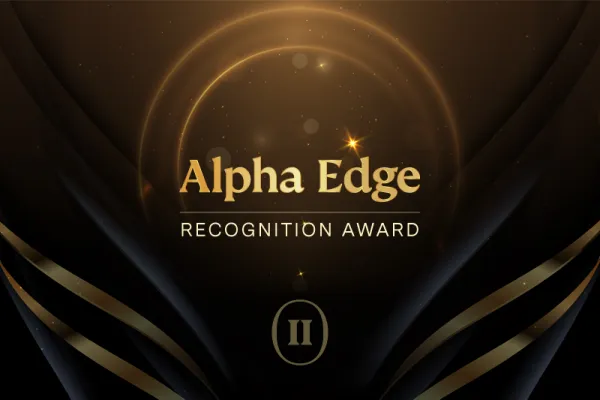David Gilmore, who will take the helm as the Harry and Jeanette Weinberg Foundation’s next chief investment officer in September, will make innovation, including potential direct investment opportunities such as cryptocurrencies, one of his top priorities.
Gilmore, currently the deputy investment chief, will succeed his longtime mentor, Jonathan Hook, who announced earlier this year that he’s retiring. The two have worked together since 2009, initially helping to build Ohio State University’s first internal investment office and then departing alongside Hook for the Weinberg Foundation in 2014.
The soon-to-be CIO, who was director of investments at Ohio State under Hook, is drafting a plan to continue innovating at the $3.3 billion investment office, exploring categories such as Web3 — along with all the traditional investments an endowment may make.
“You have to stay on top of innovation, whether or not you’re investing in it,” Gilmore said. “I’ve been thinking a lot about how different the world will look in five or ten years.”
For the foundation, this has meant making investments in nascent assets like music royalties. While the market for rights to song catalogues is increasingly competitive, the Weinberg Foundation’s team has found a singular way to play it — no pun intended.
Gilmore likened the investment environment to the early days of cash streams from pharmaceuticals. The business “was a really interesting strategy back in the 2000s. Then you had all this money start flooding into the space and pushing returns down. We've kind of seen that play out a bit in the music royalty space.”
So the foundation invested in a fund that has exposure to music royalties outside of the United States, a much less efficient market. According to Gilmore, the cash flow, lower correlation, and duration make these assets a good fit for the foundation’s diversifying strategies allocation bucket — one of three, which also include equity and real estate.
The fund is also exploring investments in litigation finance, a strategy that involves providing capital to plaintiffs and defendants in court cases in exchange for a slice of the winnings. Gilmore said that the foundation hasn’t yet landed on the right manager, but he hopes to choose just one or two for the strategy.
As CIO, Gilmore plans to apply other lessons learned from Hook, including building a deep bench of talent on the foundation’s 11-person team while remaining open to new investment strategies.
In working alongside Hook to grow two investment offices, Gilmore said he learned the importance of hiring a great team — and creating an environment of ownership.
“We want everyone on the team to understand what’s going on and what is in our portfolios,” said Gilmore. He added that he wants members of team to be a part of the ultimate decision-making process — and to provide them with growth opportunities.
“I really try to maintain an abundance mindset,” Gilmore said. “As I'm entering this leadership role, this is a great lesson I learned from John.”
And it’s not always a no-brainer. “We want to celebrate other team members’ successes — even when they get new jobs,” he said.
Gilmore is becoming CIO at an inflection point in the market, with rising interest rates, increasing inflation, war in Ukraine, and a potential recession on the horizon.
Gilmore argues the allocator’s history makes it well positioned. “We are blessed to have a large real estate portfolio in a great location,” Gilmore said. The asset class makes up one-third of the portfolio, as Harry Weinberg left real estate, primarily in Hawaii, to the foundation.
The foundation has made other changes, including shifting to more growth-oriented strategies. Gilmore, who expects inflation to remain elevated, is doing what he can to decrease fixed-income while remaining cognizant of the fund’s liquidity needs.
The Weinberg Foundation’s team thinks about risk management through a liquidity lens.
It has to. Unlike some institutions, the foundation doesn’t have inflows. In other words, investment returns not only keep the foundation’s lights on, but also allow it to continue making grants. To make sure that happens, the team analyzes volatility, correlations, drawdown expectations, and expected returns across its portfolio and for each individual investment.
Enter cryptocurrency — one of the most volatile assets available today.
“We’ve made a couple of crypto-related investments in our portfolio at this point,” Gilmore said. “It’s early for the industry and for our portfolio. I think in the first innings, a lot of endowments and foundations didn’t have a lot of exposure, but you saw the big home runs that were made in 2021.”
Endowments at Duke University and Washington University in St. Louis were big-time winners in the last crypto run-up. Duke reportedly invested in crypto trading platform Coinbase in 2015, according to a Markov Processes International analysis. Meanwhile, Wash U, 2021’s top endowment performer made a “super tiny investment” in crypto back in 2014, and has added to it since then, according to CIO Scott Wilson.
What especially excites Gilmore about cryptocurrency is its practical uses outside the U.S. “I think it’s really hard for U.S.-based investors to understand how attractive certain parts of a decentralized fintech space can be to those in other countries that don’t have the dollar as base currency,” he said.
While the Weinberg Foundation didn’t have exposure to the last crypto run-up, the fund may be able to take advantage of the next one. Gilmore said the foundation has added exposure to cryptocurrencies through venture and growth investments. The team hasn’t invested directly in tokens yet, but it might in the future.
“I don’t think about what we’re not going to invest in,” said Gilmore. “I try not to have absolutes... I don’t think there’s anything that I wouldn’t look at or explore if it’s institutional quality.”







